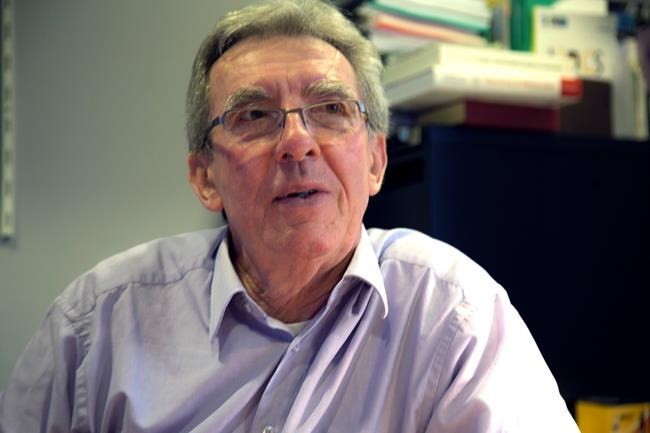
In this Oct. 2014 photo, provided by the University of Strasbourg (Unistra) Nobel laureate Jean-Pierre Sauvage speaks during an interview in Strasbourg, eastern France. Frenchman Jean-Pierre Sauvage, British-born Fraser Stoddart and Dutch scientist Bernard "Ben" Feringa share the 8 million kronor ($930,000) prize for the "design and synthesis of molecular machines," the Royal Swedish Academy of Sciences said. Three scientists won the Nobel Prize in chemistry on Wednesday, Oct. 5, 2016 for developing the world's smallest machines, work that could revolutionize computer technology and lead to a new type of battery. (Catherine Schroder/Unistra via AP)
October 05, 2016 - 4:33 AM
The Nobel Prize in chemistry has been awarded to three scientists who helped develop the smallest machines known to man.
They are Frenchman Jean-Pierre Sauvage, 71, of the University of Strasbourg; British-born Fraser Stoddart, a 74-year-old chemistry professor at Northwestern University in Illinois in the United States; and Dutch scientist Bernard "Ben" Feringa, 65, a professor of organic chemistry at the University of Groningen, the Netherlands.
Here's a look at why they won and the importance of their achievements:
SIGNIFICANCE
The Royal Swedish Academy of Sciences said the three developed tiny molecular machines that will likely be used for the development of new computer chips, batteries and energy storage systems. They are credited with designing and synthesizing molecules with controllable movements that can perform tasks when energy is added. It is almost impossible to imagine how small the machines are — roughly one thousand times smaller than the width of a strand of human hair.
REACTION
Alison Stoddart, the chemist daughter of Fraser Stoddart, said her father called her and was "absolutely ecstatic" about the news.
She said she was pleased to see the promising work of the three laureates recognized.
"It's just really lovely, it's fundamental chemistry; it's synthesis in making these machines. ... What it could make in years to come is very exciting," she told The Associated Press by telephone from Cambridge, England.
"They just make really interesting molecules and they love doing it and it's just really nice they won together," she said.
French Prime Minister Manuel Valls praised Sauvage for his "avant-garde" research and phenomenal results.
"French research has once again been celebrated with a Nobel Prize," he tweeted.
Sauvage told French TV the award had not been anticipated.
"It's obviously a memorable moment of happiness and a big surprise," he said. "I was not expecting at all to be one of the lucky prize winners this year, or even in the future."
PRIZE
The Nobel Prize carries with it an 8 million kronor ($930,000) prize in addition to a medal and a diploma that is handed out at the award ceremonies each December. The chemistry prize is the last of three science prizes to be awarded. Still to come are awards for literature and economics and the Nobel Peace Prize.
News from © The Associated Press, 2016